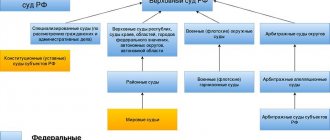In the subsystem of federal courts of general jurisdiction, the district court has been considered the main link for many decades. This is due primarily to its broad competence as a judicial authority, as well as the volume of work that it actually performs.
Of the total mass of criminal and civil cases, cases of administrative offenses, the main level civil courts account for a significant majority. They do not consider only those criminal and civil cases, cases of administrative offenses that, in accordance with the law, fall under the jurisdiction of other courts of general jurisdiction (territorial, regional, military courts, magistrates, etc.) or arbitration courts.
They also have to make decisions on many issues that arise before and after the trial of criminal cases - when they are initiated, during the investigation, checking the legality, validity and fairness of sentences, as well as in the process of executing sentences that have entered into legal force. They are also entrusted with the consideration of complaints related to decisions made in cases of administrative offenses - they are called upon to check the legality and validity of the imposition of administrative penalties both by magistrates and other bodies and officials (see Article 30.1 of the Code of Administrative Offenses). In this regard, it is customary to consider district courts to be the main link of the judicial system: the population, as a rule, addresses their problems to these courts, where they most often find the necessary answer.
The powers, procedure for the formation and activities of the district court are established by federal constitutional law.
The organization of district courts is determined by:
- Constitution of the Russian Federation;
- Law on the Judicial System;
- Law on courts of general jurisdiction in the Russian Federation;
- Law on the status of judges and other legislation.
A court of this level operates in each district or other similar administrative-territorial unit, as well as in a city that does not have a district division. One court is created in a district (city), but it is possible to create one court for a district and a city or for a district and cities located on the territory of a given district. It is possible to organize inter-district courts, taking into account the volume of work and other factors.
The procedure for the creation and abolition of courts of this level is determined by the Federal Constitutional Law of December 31, 1996 No. 1-FKZ “On the Judicial System of the Russian Federation”.
Judicial supervision over the activities of district courts is carried out by the supreme courts of republics, regional and regional courts, city courts in federal cities - Moscow and St. Petersburg, courts of the autonomous region and autonomous districts.
Legal status of the court
general characteristics
The concept of “court” in criminal and civil proceedings means not only the district court, but also the Supreme Court of the Russian Federation, the Supreme Courts of the republics, regional, regional, city courts, the court of the autonomous region, the courts of the autonomous districts, military courts, judges (magistrates), acting within the limits of their criminal procedural and civil procedural competence (clause 1 of article 34 of the Code of Criminal Procedure).
In criminal proceedings, the court appears from the moment:
- acceptance of a statement (report) about a privately charged crime;
- appealing to him with a petition to accept the provisions provided for in Part 2 of Art. 29 of the Code of Criminal Procedure of the procedural decision at the stage of preliminary investigation;
- filing a complaint against him against an illegal and (or) unfounded action (inaction, decision) of an investigator (inquiry officer, etc.), prosecutor;
- transfer of a criminal case (material) to court.
The court is the main subject of civil and criminal procedural legal relations. In each type of the above relations, the legal status of the court is unique. The legal status of the latter also changes depending on the stage of the process in which the court acts (trial, cassation proceedings, etc.), as well as on what type of cases are resolved by the court (private prosecution cases; public prosecution cases; consideration of a complaint against actions ( inaction) and decisions of the prosecutor, investigator, inquiry body and interrogator; decision-making at the pre-trial stage of the criminal process, etc.).
Usually, when talking about the legal status of the court, even in educational literature on criminal, civil and arbitration processes, we only talk about general provisions regarding the consideration of cases by the court at first instance, as well as the principles of justice. Indeed, in many ways, the legal status and place of the court in civil, arbitration and criminal proceedings are predetermined by the action of such principles of justice as the principle of administration of justice only by the court, the principle of independence of courts, independence of judges (jurors and arbitration assessors) and their subordination only to the law, etc. Nevertheless, the legal status of the court is not only its manifestation in one or another procedural institution, it is an independent legal institution, consisting of norms that establish a specific list of rights and obligations of the court.
It is not possible in this textbook to list all the rights and obligations of the court. Here the legal status of this subject will be described in detail only at the stage of judicial proceedings in criminal proceedings.
The trial procedure is detailed by the legislator. It mainly consists of the rights and duties of the court, the presiding judge and other judges.
Legal status of the court when considering criminal cases at first instance
The court has powers that can be exercised at any stage of the consideration of the case at first instance. There are five such stages:
- preparatory part of the court session;
- judicial investigation;
- debate between the parties;
- the last word of the defendant;
- sentencing decision.
The main part of the legal status of the court is specific to each part of the court session.
1. General rights of the court during trial
According to the Code of Criminal Procedure, the court at any stage of the trial, if there are grounds for doing so, can carry out the following actions (make decisions):
- postpone the trial (part 1 of article 253, part 2 of article 258 of the Code of Criminal Procedure);
- suspend proceedings against the defendant or all proceedings in the case (Part 3 of Article 253 of the Code of Criminal Procedure);
- make a decision on the search for an absconding defendant (Part 3 of Article 253 of the Code of Criminal Procedure);
- terminate a criminal case at a court hearing (Article 254 of the Code of Criminal Procedure);
- provide the prosecutor and defense attorney who has newly entered the trial with time to familiarize themselves with the materials of the criminal case and prepare for participation in the trial (part 4 of article 246, part 3 of article 248 of the Code of Criminal Procedure);
- choose, change or cancel a preventive measure against the defendant (Article 255 of the Code of Criminal Procedure);
- extend the period of detention of the defendant until a court decision is made on the merits of the case, but not more than for three months (Part 3 of Article 255 of the Code of Criminal Procedure).
Determinations or resolutions: on the return of the criminal case to the prosecutor, on the termination of the criminal case, on the election, change or cancellation of a preventive measure against the defendant, on the trial in the case provided for in Part 5 of Art. 247 of the Code of Criminal Procedure, in the absence of the defendant, on the extension of the period of his detention, on challenges, on the appointment of a forensic examination - must be made in the deliberation room, presented in the form of a separate procedural document signed by the judge or judges, if the criminal case is considered by the court collectively.
2. Court at the preparatory stage of trial
During the preparatory part of the trial, the court has the right to bring a defendant who failed to appear without good reason, as well as choose or change a preventive measure against him (Part 3 of Article 247 of the Code of Criminal Procedure).
Basically, the legislator entrusts him with the following responsibilities:
- listen to the opinions of all participants in the trial regarding the stated petition;
- consider each submitted request;
- satisfy the petition or issue a reasoned ruling (resolution) to refuse to satisfy the stated petition (Part 2 of Article 271 of the Code of Criminal Procedure);
- satisfy the request to interrogate a person as a witness or specialist who appeared in court at the initiative of a party (part 4 of article 271 of the Code of Criminal Procedure);
- resolve declared challenges (part 2 of article 266 of the Code of Criminal Procedure);
- listen to the opinions of the parties on the possibility of trial in the absence of any of the participants in the criminal proceedings;
- make a ruling (decision) to continue the proceedings or to postpone them (Article 272 of the Code of Criminal Procedure).
3. Procedural position of the court during the judicial investigation, debates of the parties and the last word of the defendant
The specifics of the next stage of the trial are also reflected in the legal status of the court. During the judicial investigation, the court is authorized to take the following actions (make decisions):
- if certain conditions exist, consider a civil claim in the absence of a civil plaintiff or leave a civil claim without consideration (parts 2 and 3 of Article 250 of the Code of Criminal Procedure);
- examine the case in the absence of the victim, in the event of the latter’s failure to appear, or recognize the victim’s appearance as mandatory (Part 2 of Article 249 of the Code of Criminal Procedure);
- request documents (Article 286 of the Code of Criminal Procedure);
- demand from the defendant (Part 2 of Article 275 of the Criminal Procedure Code), witness and victim (Part 1 of Article 279 of the Criminal Procedure Code)
- presentation of written notes that the latter used when giving evidence;
- attach to the case the documents that the witness, the victim, read when giving evidence (Part 2 of Article 279 of the Code of Criminal Procedure);
- summon for questioning an expert who gave an opinion during the preliminary investigation, to clarify or supplement the conclusion he gave (Part 1 of Article 282 of the Code of Criminal Procedure);
- call a teacher when questioning witnesses who are victims aged from fourteen to eighteen years (part 1 of article 280 of the Code of Criminal Procedure);
- call the legal representatives of a minor witness or victim (Part 4 of Article 280 of the Code of Criminal Procedure);
- make a decision on the interrogation of a minor witness or victim, in order to protect the rights of minors at the request of the parties or on their own initiative, in the absence of the defendant (Part 6 of Article 280 of the Code of Criminal Procedure);
- Before interrogation, provide the expert with the time necessary to prepare answers to questions from the court and the parties (Part 3 of Article 282 of the Code of Criminal Procedure);
- order a forensic examination, including a repeated or additional one (Article 283 of the Code of Criminal Procedure);
- formulate questions to the expert when ordering a forensic examination (Part 2 of Article 283 of the Code of Criminal Procedure);
- examine material evidence (Part 1 of Article 240 of the Code of Criminal Procedure), including at its location (Article 284 of the Code of Criminal Procedure);
- make a decision to interrogate the defendant in the absence of another defendant (part 4 of article 275 of the Code of Criminal Procedure);
- if it is necessary to ensure the safety of a witness, his close relatives, relatives and close persons, conduct an interrogation of the latter without disclosing the true data about the identity of the witness, in conditions that exclude visual observation of the witness by other participants in the trial, about which the court is obliged to make a ruling or resolution (Part 5 of Art. 278 Code of Criminal Procedure);
- hear testimony of the defendant, victim, witnesses, expert opinion (part 1 of article 240 of the Code of Criminal Procedure);
- ask questions to the defendant after his interrogation by the parties (part 3 of article 275 of the Code of Criminal Procedure);
- subject to compliance with the conditions provided by law, provide the parties with the opportunity to familiarize themselves with previously undisclosed information about the identity of the witness (Part 5 of Article 278 of the Code of Criminal Procedure);
- make a decision on the disclosure in whole or in part of the contents of the protocols of investigative actions, the conclusion of an expert (specialist), data during the preliminary investigation, as well as documents attached to the case or presented at the court hearing (Article 285 of the Code of Criminal Procedure);
- attach to the case documents presented at the court hearing (Article 286 of the Code of Criminal Procedure);
- inspect the premises or area (Article 287 of the Code of Criminal Procedure);
- conduct an investigative experiment (Article 288 of the Code of Criminal Procedure) and an examination not accompanied by exposure of the face (Article 290 of the Code of Criminal Procedure);
- present a person or object for identification (Article 289 of the Code of Criminal Procedure);
- disclose protocols and other documents (Part 1 of Article 240 of the Code of Criminal Procedure);
- repeatedly, at the request of a party, to consider the issue of recognizing excluded evidence as admissible (Part 7 of Article 235 of the Code of Criminal Procedure);
- repeat, at the request of the prosecutor or defense attorney who has newly entered the trial, interrogations of witnesses, victims, experts (specialists) or other judicial actions (part 4 of article 246, part 3 of article 248 of the Code of Criminal Procedure).
The need to ensure the rights and legitimate interests of persons participating in the trial, as well as a high level of reliability of the data obtained during the judicial investigation, predetermined the importance of enshrining in the law a certain range of responsibilities of the court:
- Taking into account the opinions of the parties, determine the order of presentation of evidence by the defendants, if there is several of them in a criminal case.
- Call a teacher and a legal representative when interrogating victims or witnesses under the age of fourteen years or with physical or mental disabilities (parts 1 and 4 of Article 280 of the Code of Criminal Procedure).
- Report the testimony of the witness (victim) to the defendant, who has been removed from the courtroom during the interrogation of the minor witness (victim).
- Provide the defendant, removed from the courtroom during the interrogation of a minor witness or victim, with the opportunity to ask questions to this witness or victim (Part 6 of Article 280 of the Code of Criminal Procedure).
- Hear the opinion of the participants in the trial on the issues presented by the parties to the expert.
- Consider questions posed by the parties to the expert, reject those that do not relate to the criminal case or the competence of the expert (Part 2 of Article 283 of the Code of Criminal Procedure).
- Obtain a person’s consent to the disclosure in an open court of his correspondence, recordings of telephone and other conversations, telegraphic, postal and other messages, as well as to study photographic materials, audio and (or) video recordings, filming of a personal nature (Part 4 of Art. 241 Code of Criminal Procedure).
- Inspect material evidence located in court and presented at the court hearing (Article 284 of the Code of Criminal Procedure).
- Discuss and resolve requests to supplement the judicial investigation, if any are filed (Article 291 of the Code of Criminal Procedure).
After the judicial investigation, the court proceeds to hearing the arguments of the parties, and then the last word of the defendant. At the same time, pursuing the same goals, but first of all ensuring the accused the right to defense, the court must:
- establish the sequence of speeches of the participants in the debate of the parties (part 3 of article 292 of the Code of Criminal Procedure);
- do not limit the duration of the debate between the parties to a certain time (Part 5 of Article 292 of the Code of Criminal Procedure);
- do not limit the duration of the last word to a certain time (part 2 of article 293 of the Code of Criminal Procedure);
- resume the judicial investigation if the participants in the debate of the parties or the defendant in the last word report new circumstances relevant to the criminal case, or declare the need to present new evidence to the court for examination (Article 294 of the Code of Criminal Procedure);
- leave immediately after hearing the last word of the defendant to the deliberation room to decide the verdict (Part 1 of Article 295 of the Code of Criminal Procedure).
4. Legal status of the court when passing a sentence
The list of rights and obligations of the court at the final stage of the trial is determined by the need to make a final procedural decision for this stage. In this connection, the court, if there are grounds for doing so, is obliged to do the following in order to resolve the case:
1. Decide a lawful, justified and fair verdict (Part 1 of Article 297 of the Code of Criminal Procedure) in the deliberation room (Part 1 of Article 298 of the Code of Criminal Procedure) in the name of the Russian Federation (Article 296 of the Code of Criminal Procedure).
2. Base the verdict only on the evidence that was considered at the trial (Part 3 of Article 240 of the Code of Criminal Procedure).
3. Resolve the following issues when deciding a sentence:
a) whether it has been proven that the act of which the defendant is accused took place; b) whether it has been proven that the defendant committed the act; c) whether this act is a crime and what paragraph, part, or article of the Criminal Code provides for it; d) whether the defendant is guilty of committing this crime; e) whether the defendant is subject to punishment for the crime he committed; f) whether there are circumstances mitigating or aggravating the punishment; g) what punishment should be imposed on the defendant; h) whether there are grounds for passing a sentence without imposing punishment or exemption from punishment; i) what type of correctional institution and regime should be determined for the defendant when assigning him a sentence of imprisonment; j) whether the civil claim is subject to satisfaction, in whose favor and in what amount; k) whether it has been proven that the property subject to confiscation was obtained as a result of the commission of a crime or is the proceeds of this property or was used or intended to be used as an instrument of crime or for the financing of terrorism, an organized group, an illegal armed group, a criminal community (criminal organization) ; l) what to do with property that has been seized to secure a civil claim or possible confiscation; m) how to deal with material evidence; o) who should bear the procedural costs and in what amount; p) should the court in cases provided for in Art. 48 of the Criminal Code, deprive the defendant of a special, military or honorary title, class rank, as well as state awards; p) whether compulsory measures of educational influence can be applied in cases provided for in Art. Art. 90 and 91 of the Criminal Code; c) whether compulsory medical measures can be applied in cases provided for in Art. 99 CC; r) whether the preventive measure against the defendant should be canceled or changed.
4. Resolve questions “a” - “g” for each crime separately if the defendant is accused of committing several crimes.
5. Resolve questions “a” - “g” in relation to each defendant separately, if several defendants are accused of committing a crime (Article 299 of the Code of Criminal Procedure).
6. Discuss (once again) when rendering a sentence the question of the defendant’s sanity in cases where it has already arisen during the preliminary investigation or trial (Part 1 of Article 300 of the Code of Criminal Procedure).
7. Refuse to satisfy a civil claim if the crime has not been established or the accused is not involved in the commission of the crime.
8. Leave the claim without consideration in other cases (Part 2 of Article 306 of the Code of Criminal Procedure).
9. Draw up a verdict in the language in which the trial was conducted, with introductory, descriptive, motivational and operative parts (Part 1 of Article 303 of the Code of Criminal Procedure).
Depending on how the stage of the trial ends and what preceded the adoption of this particular decision, the court is presented with some alternative action. He has the right:
1) in the process of passing a sentence, take a break for rest and leave the deliberation room (Part 2 of Article 298 of the Code of Criminal Procedure);
2) release the defendant immediately in the courtroom from custody upon his acquittal or conviction without imposing a sentence or with release from serving the sentence or in the event of his conviction to a punishment not related to imprisonment or to a punishment in the form of imprisonment conditionally (Article 311 of the Code of Criminal Procedure);
3) recognize the civil plaintiff’s right to satisfy the civil claim and transfer the issue of the amount of compensation for the civil claim for consideration in civil proceedings, if necessary, make additional calculations related to the civil claim, requiring the postponement of the trial (Part 2 of Article 309 of the Code of Criminal Procedure);
4) make a ruling or resolution on:
a) transferring minor children of a person sentenced to imprisonment, other dependents, as well as elderly parents in need of outside care, into the care of close relatives, relatives or other persons, or placing them in children's or social institutions (Part 1 of Article 313 of the Code of Criminal Procedure); b) taking measures to protect the unattended property or home of a person sentenced to imprisonment (Part 2 of Article 313 of the Code of Criminal Procedure); c) the amount of remuneration payable for the provision of legal assistance to a defense attorney participating in a criminal case as assigned (Part 3 of Article 313 of the Code of Criminal Procedure);
5) issue a private ruling or resolution (part 4 of article 29 of the Code of Criminal Procedure).
The given list of court powers at the trial stage is not exhaustive.
Legal relations between participants in criminal proceedings, whose function is to resolve a criminal case, and other subjects involved in the sphere of legal proceedings are not limited to those where one of the participants (in the broad sense of the word) is the court. At the same time, it should be noted that a significant role in the judicial proceedings is assigned to the presiding officer.
Let's sum it up
The district court, as we have already said, is a very important authority, since it occupies the first position among courts of general jurisdiction. There are these institutions in every district of your city. If you are interested, ask such a request on the Internet, and look at the online map of your city. You will see that what we say is true.
Judges who work in the instance we are studying have the right to consider cases, most of them representing civil and criminal proceedings. However, as you may remember, the district court must resolve not only issues directed to it personally, but also cases transferred “inherited” from world courts.
The Judge's Code of Ethics is the basis for the implementation of independent and fair justice. Therefore, every citizen holding the position of judge is obliged to comply with the high standards established by this code. We will describe in detail the main provisions of this document in a special article.
The chairman of the district court, his rights and obligations
Chairman of the district court:
- presides over court hearings and, accordingly, exercises procedural powers established by the Code of Criminal Procedure and the Code of Civil Procedure;
- organizes the work of the court;
- establishes the internal rules of the court on the basis of the standard internal rules of the courts approved by the Council of Judges of the Russian Federation and monitors their implementation;
- distributes responsibilities among his deputies and judges;
- appoints judges as presiding judges at court hearings;
- conducts personal reception, organizes the work of the court to receive citizens and consider proposals, applications and complaints;
- manages the study and generalization of judicial practice and the maintenance of judicial statistics;
- makes submissions to government bodies, public organizations and officials on eliminating violations of the law and circumstances that contributed to the commission of offenses;
- carries out general management of the activities of the court apparatus, including appointing and dismissing employees of the court apparatus, as well as distributing responsibilities between them, making decisions on encouraging employees of the court apparatus or bringing them to disciplinary liability, organizing work to improve the qualifications of employees of the court apparatus ships;
- approves the job regulations of court staff;
- regularly informs judges and court staff about its activities and the activities of the court;
- organizes work to improve the qualifications of judges;
- organizes work to promote legal knowledge and explain legislation;
- expresses his thoughts to the head of the department (department) of the Judicial Department at the Supreme Court of the Russian Federation on the possibility of redistributing the vacancies created in the district court to the positions of judges (Clause 5, Part 1, Article 16 of the Federal Law “On the Judicial Department at the Supreme Court of the Russian Federation”);
- prepares for the head of the department (department) of the Judicial Department at the Supreme Court of the Russian Federation a proposal for appointment to the position of administrator of the court he heads (Part 1, Article 18 of the Federal Law “On the Judicial Department at the Supreme Court of the Russian Federation”);
- determines the composition of the commission that carries out the destruction of material evidence in accordance with the verdict (ruling, resolution) of the court;
- imposes on the person the obligation to record and store material evidence that is stored in court separately from the case;
- gives instructions at least once a quarter to check the correctness of the journal of material evidence, the correspondence of the records to the actual presence of things, the timeliness and correctness of the execution of the court decision in relation to material evidence;
- gives an order to forward the court case to the body that is granted by law the right to claim the case, upon its written request;
- exercises control over the execution of sentences, decisions, rulings, court orders and court decisions;
- before the sentence is executed, provides, at the request of close relatives, relatives of the convicted person in custody, the opportunity to visit him (Article 395 of the Code of Criminal Procedure);
- in order to ensure uniformity of the load on justices of the peace, if the workload on a justice of the peace exceeds the average load on a justice of the peace for the judicial district, by his reasoned order he transfers part of the criminal, civil cases, cases of administrative offenses and statements of claim received by the justice of the peace of one court district, magistrate of another judicial district of the same judicial district (clause 1.1 of article 6.2 of the Law of the Russian Federation “On the status of judges in the Russian Federation”);
- exercises other powers.
In criminal and civil proceedings, judges of the district court, including the chairman of the given court, consider and resolve criminal cases individually.
Recusal from a judge
A challenge must be filed before the case is considered on the merits and a decision is made on the case. It is advisable to submit a request for recusal in writing, attaching the necessary evidence.
In the petition, indicate the case number, the name of the court and the parties to the dispute, the grounds for challenge and the request for the judge's challenge. Don't forget to sign the petition.
A challenge can be made when the judge:
when considering this case, acted in the process as a prosecutor, assistant judge or secretary, witness, expert, specialist;
is a relative of one of the parties;
gives reason to assume the presence of other reasons entailing his interest in the dispute under consideration.
The party's request for recusal is resolved by the same judge. If the issue is resolved positively, the case will be transferred to another judge.
A ruling refusing to satisfy a motion to disqualify a judge cannot be appealed separately. But you can present your reasons when appealing the decision.
Choice of jurisdiction by the plaintiff
There are exceptions to the general rule of territorial jurisdiction.
There are claims that the plaintiff has the right to bring to the court of his choice, that is, to choose the jurisdiction of the civil case.
The most common and typical situations:
- statement of claim for the collection of child support;
- statement of claim to establish paternity;
- a statement of claim for divorce, if minor children live with the plaintiff or for health reasons;
- claim for consumer protection;
- claim for compensation for personal injury.
In addition, this includes cases where:
- the location of the defendant is unknown;
- when the claim is brought at the location of the branch,
- at the place of conclusion or execution of the contract,
- when the case involves several defendants at different addresses,
In other cases provided for in Article 29 of the Code of Civil Procedure of the Russian Federation.
Determination of jurisdiction
When filing a statement of claim, it is the plaintiff who must determine the jurisdiction of the case to a particular court. If the jurisdiction of the courts is determined incorrectly, the statement of claim will be returned to the citizen without consideration.
We recommend! Magistrate and civil cases
First of all, it is necessary to decide which level of court will have jurisdiction over the case.
The following levels of vessels are distinguished::
- magistrates, jurisdiction of cases is determined by Art. 23 Code of Civil Procedure of the Russian Federation;
- district (city) courts, jurisdiction is specified in Art. 24 Code of Civil Procedure of the Russian Federation;
- courts of the constituent entities of the Russian Federation, the jurisdiction of the courts is determined in Art. 26 Code of Civil Procedure of the Russian Federation;
- Supreme Court of the Russian Federation, jurisdiction is enshrined in Art. 27 Code of Civil Procedure of the Russian Federation.
In addition, there are specialized courts, these include military courts, for which special jurisdiction is determined for civil cases, which is enshrined in Article 25 of the Code of Civil Procedure of the Russian Federation.
The vast majority of civil cases fall under the jurisdiction of district courts and magistrates.
Contractual jurisdiction
Contractual jurisdiction means that the parties, when concluding a civil contract, have the right to choose a specific court in which disputes between them will be heard.
The parties have the right to change the territorial jurisdiction of a civil case by choosing any court, anywhere in the Russian Federation.
The agreement must be concluded in writing. The agreement must specifically define the jurisdiction of the case and indicate the full name of the court in which the disputes will be heard.
Contractual jurisdiction does not apply to claims that are within the jurisdiction of the courts of a constituent entity of the Russian Federation or the Supreme Court of the Russian Federation. Contractual jurisdiction cannot change the exclusive jurisdiction of a civil case established by Article 30 of the Code of Civil Procedure of the Russian Federation.
Territorial jurisdiction of civil cases
According to the general rule, enshrined in Article 28 of the Code of Civil Procedure of the Russian Federation, statements of claim are filed by the plaintiff in the court at the place of residence of the defendant.
If the defendant is an organization or institution (LLC, PJSC), then the statement of claim is filed by the plaintiff at the location of the legal entity.
For individual entrepreneurs, jurisdiction is determined by registration at the place of residence.
The place of residence of a citizen is the place where he permanently or primarily resides.
The law establishes that a citizen is obliged to register at his place of residence within 7 days after arrival. That is, the obvious option to go to court is to file a statement of claim at the place of its registration.
Legal entities and individual entrepreneurs provide information about their location to the registration authority - the tax office.
Information from the Unified State Register of Legal Entities and Unified State Register of Individual Entrepreneurs is available to any citizen. Therefore, it is advisable for the plaintiff to check the location of the defendant before filing a claim.
If you do not know the location of the defendant, you can indicate absolutely any address. After the claim is accepted, the responsibility for notifying the defendant lies with the court, which in this case will conduct a search for the defendant on its own.
The biggest trouble that threatens you in this case is that it may turn out that the defendant is in another city, then the claim will be sent to another court with jurisdiction.
We recommend! Labor disputes and their resolution in court
Transfer of the case to jurisdiction
According to the general rule, enshrined in Article 33 of the Code of Civil Procedure of the Russian Federation, a change in the jurisdiction of a case, which was decided by the court in compliance with the rules of jurisdiction, is not allowed.
There are exceptions to this rule when the court can transfer a case with jurisdiction to another court:
- the court finds that it accepted the case in violation of jurisdiction;
- an application will be received from the defendant, whose place of residence was not known when the claim was filed;
- the plaintiff and defendant will request the transfer of the case to the location of the evidence;
- all judges were challenged.
The transfer of the case can be carried out by the court on its own initiative or upon an application for transfer of the case to jurisdiction, written by an interested person. The transfer of a civil case to another court is formalized by a court ruling, which can be appealed by filing a private complaint against the court's ruling.
Author: Oleg Vladimirovich Roslyakov, source.








